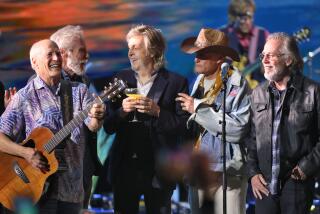JAZZ REVIEW : Rosemary Clooney Highlights Missed-Opportunity Bowl Bill
- Share via
The Carnegie Hall Jazz Band is one of the finest large jazz ensembles in the country. Organized in 1992, they are a talented assemblage of New York players whose skills range easily from the traditional to the avant-garde.
But the Jazz Band had very little real opportunity to strut its stuff in a debut performance at the Hollywood Bowl Wednesday night.
Rather than fully display the group’s versatility, trumpeter Jon Faddis, the group’s music director, elected to present a program dominated by an inordinately lengthy tribute to Benny Goodman. Contemporary reworkings of such Goodman classics as “Let’s Dance,” “Memories of You” and “Sing, Sing Sing” by arranger Jim McNeely effectively locked the Jazz Band into a single stylistic box.
Despite some occasional excellent soloing from Bobby Watson, Ralph Moore and Renee Rosnes, the bottom line on the revision of well-known jazz numbers is, simply, whether or not a new perspective can be offered without damaging the originals. In this case, the Goodman retrospective too often seemed to be cranking out massive dissonances and offset rhythms that interfered with, rather than enhanced, the natural, flowing swing of familiar music.
Ironically, the Jazz Band’s versatility was more appealingly visible in the subtle and supportive background they supplied for Rosemary Clooney. At 66, the still sweet-voiced pop star of the ‘50s has matured into a gifted ballad singer with a sympathetic understanding of jazz rhythms. Well aware of the talent in her accompanying ensemble, Clooney made the most of it, especially on such slower tunes as “How Deep Is the Ocean?” and “Sophisticated Lady.” Curiously, her slight hoarseness, coupled with a somewhat pinched upper range helped her interpretations, adding a touch of vulnerability that was strikingly effective in a world-weary and (for a song traditionally sung by aging men) gender-switching reading of “September Song.”
Charlie Haden’s Quartet West, opening the show, had almost no chance to stretch out in their brief, three-number segment. The addition of harmonica player Toots Thielemans triggered some crisply professional improvisational segments, most notably during a lovely rendering of Henry Mancini’s “Days of Wine and Roses” and a spirited romp through “Au Privave.” But the obvious lack of preparation precluded the possibility that the music would come together in any kind of purposeful fashion.
It was another example of the evening’s unfulfilled jazz promises. On a program that could have, and should have, been far better (Clooney’s bright moments aside), neither the Carnegie Hall Jazz Band nor Quartet West received the kind of meaningful showcase they deserved.
More to Read
The biggest entertainment stories
Get our big stories about Hollywood, film, television, music, arts, culture and more right in your inbox as soon as they publish.
You may occasionally receive promotional content from the Los Angeles Times.









